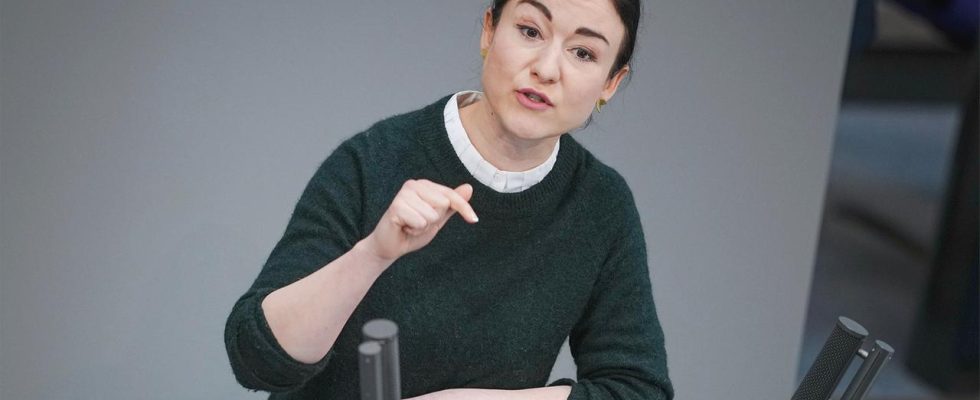interview
The traffic light dispute about basic child security continues. In an interview, the Saxon Green MP Paula Piechotta warns that conflicts should be resolved internally. One should not strengthen the AfD any further.
tagesschau.de: Ms. Piechotta, the traffic light had decided to restart. Why did he fail at the first cabinet meeting after the chancellor’s leave?
Paula Piechotta: Traffic light performance needs to improve. It must rebuild trust in the state’s ability to act. In eastern Germany in particular, we feel that there is practically no longer a buffer for missteps. We have to shape things now and present a better image to the outside world. Otherwise the AfD will become even stronger. Apparently that didn’t happen last Wednesday.
To person
Paula Piechotta has been in the Bundestag for the Greens since 2021. The finance and health politician from Leipzig heads the East regional group of the parliamentary group there.
tagesschau.de: Why is there a problem with understanding in the coalition even after two years of traffic lights?
Piechotta: Many questions were left unanswered for 16 years under Angela Merkel, from digitization to social security and the condition of the transport infrastructure. This backlog of reforms is now preventing us from responding effectively to the current crises. You can’t always solve problems with money either, also because Merkel has too often given away tax revenue to the federal states on a permanent basis. In addition, three-party coalitions are more difficult anyway.
That is why it is all the more important that the decentralized actors understand how this coalition works. You now have to make clear announcements that the performance will be as good as it was in the first traffic light year. Back then, we introduced an incredible number of laws – precisely because we had a common drive: to modernize the country.
Rediscover “Spirit of Traffic Lights”.
tagesschau.de: Do you still believe in the “progress coalition”?
Piechotta: To this day, the reference to the GroKo years means that the entire traffic light is gathered under one roof. Even in the SPD they say: Despite all the arguments, it’s great that you don’t just manage the standstill. That must become the spirit of the traffic light again.
tagesschau.de: All well and good, but this realization could have been given earlier.
Piechotta: We all know why the second traffic light year was not so constructive: the FDP was kicked out of so many state parliaments. And if that now means for the traffic light that we always have to put together packages with different legislative projects, then that’s normal. This is how tripartite coalitions work. The Kenya coalition in Saxony is no different.
“Primal interest” to improve performance
tagesschau.de: On the Twitter successor X you just wrote that as a Green you could “learn even more from the success of Fridays for Future and the failure of the last generation”. What does that mean?
Piechotta: Children and teenagers went to the “Fridays for Future” demos – and at the dinner table parents and grandparents listened and really engaged with the topic for the first time. As a result, acceptance of climate protection measures has increased. This is something that we Greens need to internalize even better. You can only achieve climate and environmental protection with majorities in society – and not just as a 15 percent party in a three-party coalition. For us, that means we have to focus our communication more on acceptance by society as a whole. We did better than that a year ago.
tagesschau.de: Where do you want to start?
Piechotta: A government polled by two-thirds of the population to see as worthy of replacement is not a government that can initiate particularly vigorous reforms. It must therefore be in a primal green interest that the reputation and performance of traffic lights improve again. You can’t badmouth each other in the coalition – no matter how annoyed you may be at times.
settle dispute internally
tagesschau.de: So you’re advocating taking action – even if a coalition partner attacks you?
Piechotta: No, it is simply necessary for us, like any good government, to resolve the conflicts internally. Ultimately, the public dispute is often just an escalation measure. Namely when you think that you can’t get any further internally. Sometimes it also plays a role that you get a lot of applause from your own party base for such attacks – I also get the biggest applause from my party members when I get upset about the FDP.
But we all have to finally understand that this will harm us more in the medium and long term – and above all our goals. The introduction of basic child security will not be more likely if the AfD is at 25 or 30 percent. The continuation of basic child security will not be more likely if there is a conservative coalition after the next federal election.
tagesschau.de: How much hope do you have for the cabinet retreat at Schloss Meseberg?
Piechotta: The traffic light has already shown several times that the cabinet meeting can be a very good format for arriving at good substantive solutions. I wish everyone involved that they make it this time too.
tagesschau.de: And if not? Will the coalition last until the end of the legislature?
Piechotta: We have a war of aggression on European soil. One should not call new elections lightly. In view of the poll numbers of both parties, you will also find few people in the SPD and FDP who advocate for it.
The interview was conducted by Thomas Vorreyer, tagesschau.de

